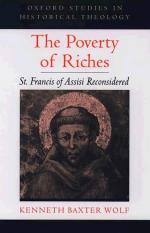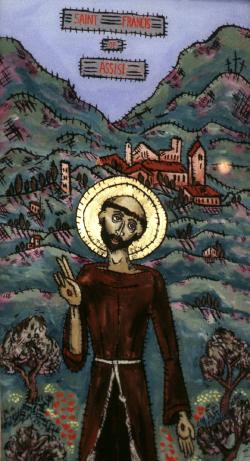Issue Date: May 23, 2003
Reviewed by ARTHUR JONES St. Francis deconstructed -- Kenneth Baxter Wolf-style. “No matter how much Francis, dressed in his soiled tunic and begging for food may have resembled the poor, he never actually succeeded in becoming poor” (Page 4). “[The Franciscans] never stopped to ask whether the theological and social rewards that came with such a willful pursuit of poverty might actually have compromised [rewards in the next world] in the process” (Page 7). “Francis was not the first Christian saint to kiss a leper” (Page 10). “What did the leper get out of his contact with Francis? The answer is: precious little. We might even begin to imagine some resentment brewing on the part of the leper” (Page 14). What have we got here? A debunking? A once-lively essay fanned out to make a book to meet the academic demands of publish or perish? Let’s try some more. “His tunic. As his amorphous conversion began to coalesce and take its distinctive shape, he became as attentive to the ‘style’ of his new outfit as he had been [to the expensive flowing fashions of his youth]” (Page 18). “Seeing Francis dressed in a soiled tunic, begging, the poor might have been led to believe they were doing something right” (Page 26).
“Francis’ poverty comes across as a spiritually therapeutic exercise designed for men of means” (Page 21). Nor does Francis’ preaching repertoire, the actual resources for which are scant, do it for Wolf. Plus, Francis copied some of his best and worst preaching antics from the wandering jongleurs. Further, “Francis, whom we are accustomed to imagining as a ‘friend of the poor’ comes across more like a spiritual Robin Hood in reverse, stealing the one spiritual advantage that the poor have -- their poverty -- and giving it to the rich” (Page 37). “[When Francis asked rich people for their fur cloaks] these poor people, as fortunate as they might have been to run into Francis right after Francis had run into a rich person, must have wondered what it was about Francis’ poverty that commanded this level of charitable response when their own plight so often went ignored by the rich people they encountered” (Page 24). Francis fails for not letting out his inner Mother Teresa, unlike the “holy” man, Raymond “Palmario” of Piacenza who gets nearly half a chapter. And again, “The poverty that Francis encountered in the world around him was not something he chose to combat. Instead it was something he chose to emulate and even to exaggerate for the sake of the spiritual benefits that it offered to him and to other people who were not born poor” (Page 25). “One is left to wonder what effect this colossal channeling of resources in support of Francis’ mission had on the relief programs that were being run by holy men, like Raymond, who were comparatively less attractive to affluent urban benefactors” (Page 89). Wolf declares, correctly, that the sources for Francis’ life are of doubtful impartiality, and, more patronizingly, that “even secular scholars, bent on approaching the saint from a more detached historical perspective, have invariably, if inadvertently, left Francis on the pedestal where they found him” (Page 3). But not pedestal-toppler Wolf, professor of history at Pomona College in Claremont, Calif., who describes his eight short chapters as “a close, critical look at a particular kind of sanctity.” He is not kind to Francis’ sanctity. Is Wolf correct? Many of his points merit weighing, but there are flaws in this book. Wolf front-end loads his case against Francis as much by how he writes as in what he produces as argument. Consequently the whole thing comes off as an entertainment for fellow readers of the Oxford Studies in Historical Theology -- “Hey guys, see who I’ve deconstructed!” Of Wolf’s actual delight with himself he says, “I was convinced that I had something that would resonate with scholars from all across the academic spectrum.” A modesty that would make Francis blush. That Wolf is a scholar comfortable in his field and period, and an able researcher, is clear in the entertaining and informative Chapter 6 -- on early Christian sanctity, the one that says the least about Francis. Otherwise, The Poverty of Riches is the work of an academic staying in trim, a five-finger exercise of 87 pages of text versus 77 pages of sources, notes, references and indexes. Certainly the topic is all to the good, in that Wolf has every right to wobble Francis-on-a-monument. Fact and source displays to one side, however, historical scholarship is not a science. The impact of facts and sources in historical research, as in statistical research, gains effect from interpretation. From the weight of the actual words used on the page. Take the word poverty. What is poverty? The Franciscans will tell you poverty is “the absence of security.” Did Francis abandon security? The record would say yes. Repeatedly, until there was nothing left to abandon. Wolf divides his little book in two, and calls the first part “The Irony of Holy Poverty.” But I’ll side with the Australian Jesuit who once said that of all the former English colonies, the United States is the only one where the English irony gene was not transmitted into the national DNA. There is no irony in stacking the odds. Stacking the odds? Not until the second half of the book does Wolf state what he should have said upfront: “I readily admit that the questions I have been posing about Francis and the idea of holy poverty have been shaped by modern liberal notions that would have been quite alien to Christians living in early 13th-century Italy.” And only in the concluding paragraph does Wolf wonder whether the money funneled to Francis might in fact have otherwise remained in the pockets of the rich after all. There is no irony because the moment Wolf forsakes the academic podium and sits down to write, his examination is transformed into a putdown. This is a man fluent in languages. One has to presume he knows precisely the weight of the words he uses. (In what follows, the italics are mine):
Implication: that such was Francis’ intent.
Implication: that Francis was not a holy man.
Implication: that this was Francis’ goal or measure.
We might indeed, for there is a relentlessness to the undercurrent of continued carping like this that corrodes the impartiality Wolf professes as a scholar. Wolf might contend that these emphases were not what he implied. But the reviewer can only work from the words on the page, marshal the existing words-as-facts for the audience as best one has them -- much as Wolf says he has done with Francis. Wolf took early refuge in the doubtful impartiality of the Francis sources. But look at it another way, the only source we have for Wolf’s impartiality is of doubtful impartiality: Wolf himself. Arthur Jones is NCR editor at large. His e-mail address is arthurjones@attbi.com National Catholic Reporter, May 23, 2003 |

